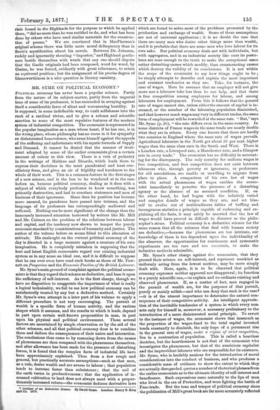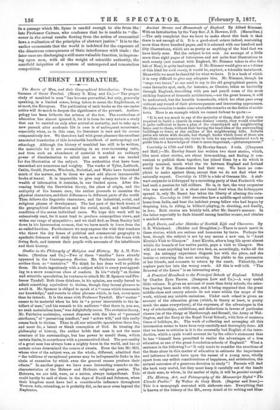MR. SYME ON POLITICAL ECONOMY.*
POLITICAL economy has never been a popular science. Partly from the nature of its subject-matter, partly from the ungenial tone of some of its professors, it has succeeded in arraying against itself a considerable force of silent and unreasoning hostility. It is supposed, in some indefinable way, to exalt selfishness into the rank of a cardinal virtue, and to give a solemn and scientific sanction to some of the most repulsive features of the modern system of industrial competition. The economist is represented in the popular imagination as a man whose heart, if he has one, is in the wrong place, whose philosophy has no room in it for sympathy or disinterested benevolence, who arms himself against the appeals of the suffering and unfortunate with his mystic formula of Supply and Demand. It cannot be denied that the manner of treat- ment adopted by some of the earlier economists gives a certain amount of colour to this view. There is a vein of pedantry in the writings of Malthus and Ricardo, which leads them to express their doctrines in the most paradoxical and least con- ciliatory form, and gives an air of frigidity and harshness to the whole of their work. This is a common feature in the first stages of a new science, and is the less to be wondered at in the case before us, because political economy, dealing as it does with a subject of which everybody professes to know something, was primarily destructive, and had to convince statesmen and men of business of their ignorance. Since then its position has become more assured, its paradoxes have passed into truisms, and the language of its professors has correspondingly mellowed and softened. Nothing can be more significant of the change than the immensely increased attention bestowed by writers like Mr. Mill and Mr. Cairnes on the problem of the relations between labour and capital, and the tendency now shown to temper the purely economic standard by considerations of humanity and justice. The author of the volume before us seems blind to this alteration of attitude. His onslaught on the current political economy of the day is directed in a large measure against a creature of his own imagination. He is completely mistaken in supposing that the best and latest English economists regard our existing industrial system as in any sense an ideal one, and it is difficult to suppose that he can ever even have read such books as those of Mr. Faw- cett on Pauperism and the Economic Position of the British Labourer.
Mr. Syme's main ground of complaint against the political econo- mists is that they regard their science as deductive, and base it upon the sufficiency of self-interest. As to the first charge, though we have no disposition to exaggerate the importance of what is really a logical technicality, we fail to see how political economy can be satisfactorily treated by any but a deductive method. Certainly Mr. Syme's sown attempt in a later part of his volume to apply a different procedure is not very encouraging. The pursuit of wealth is a specific form of human activity, and the various shapes which it assumes, and the results to which it leads, depend in part upon certain well-known propensities in man, in part upon his physical and political environment. These several factors are ascertained by simple observation or by the aid of the other sciences, and all that political economy does is to combine them and deduce the consequences of their union and interaction. The conclusions thus come to by reasoning down from the causes of phenomena are then compared with the phenomena themselves, and after allowance has been made for the presence of disturbing forces, it is found that the complex facts of industrial life have been approximately explained. Thus from a few rough and general, but practically accurate assumptions—such as that men, as a rule, desire wealth and are averse to labour ; that population tends to increase faster than subsistence ; that the soil of the earth varies in productiveneass ; that the application of in- creased cultivation to land does not always meet with a propor- tionately increased return—the economist deduces derivative laws • Outlines of an Ineitiatrial Science. By David Byme. London: Henry B. King lad 09. 1876. which are found to solve most of the problems presented by the production and exchange of wealth. Some of these assumptions are not of universal application ; it is no doubt the case that there are many men who desire other things more than wealth, and it is probable that there are some men who love labour for its own sake. But political economy deals not with individuals, but with aggregates, and in an industrial society like ours its postu- lates are near enough to the truth to make the exceptional cases rather disturbing causes which modify, than counteracting causes which destroy the validity of its conclusions. It is not within the scope of the economist to say how things ought to be ; he simply attempts to describe and explain the most important and constant tendencies as they are. Take, for instance, the case of wages. Here he assumes that an employer will not give more nor a labourer take leas than he can help, and that there is free competition among employers for labour, and among labourers for employment. From this it follows that the general rate of wages cannot rise, unless either the amount of capital is in- creased, or the number of the labouring population diminished, and that however much wages may vary in different trades, the same form of employment will be rewarded at the same rate. "But," says Mr. Syme (p. 20), "the rate differs even in the same country. in some districts of France wages in the same trade are nearly double what they are in others. Every one knows that there are hardly two counties in England where the same rate of wages prevails. Agricultural labourers in the North get about 50 per cent. higher wages than the same class earn in the South and West. There is a London rate, a Liverpool rate, a Manchester rate, and a Glasgow rate in every trade." The economist has no difficulty in account- ing for the discrepancy. The only security for uniform wages is free competition, and free competition does not exist between labourers who, through poverty or ignorance, or preference for old associations, are unable or unwilling to migrate from place to place. A comparison of his own law of wages with the actual phenomena of wages enables the econo- mist immediately to perceive the presence of a disturbing agency or the absence of an assumed condition. If, on the other hand, he had begun with the infinitely varied and complex details of wages as they are, and set him- self to evolve out of multitudinous tables of baffling and incongruous statistics a principle capable of embracing and ex- plaining all the facts, it may safely be asserted that the law of wages would have proved as difficult to discover as the philo- sopher's stone. Political economy is a deductive science for the same reason that all the sciences that deal with human society are deductive,—because the • phenomena are too intricate, our knowledge of them is too dependent upon the individuality of • the observer, the opportunities for continuous and systematic experiments are too rare and too uncertain, to make the inductive methods admissible.
Mr. Syme's other charge against the economists, that they ground their science on self-interest, and represent mankind as uniformly acting from the lowest motives, may be more simply dealt with. Here, again, it is to be observed that political economy expresses neither approval nor disapproval ; its function is a purely scientific one,—to explain and co-ordinate existing and observed phenomena. If, as a matter of fact, men engaged in the pursuit of wealth are, for the purposes of that pursuit, purely or mainly selfish—and who can deny that such is the case? —it is of the utmost importance to determine the natural con- sequence of their competitive activity. An intelligent apprecia- tion of the inevitable tendencies of a system in which every man acts only for himself is, moreover, a necessary preliminary to the introduction of a more disinterested social principle. To revert to the instance of wages, the economist shows that inasmuch as the proportion of the wages-fund to the total capital invested tends constantly to diminish, the only hope of a permanent rise in the general rate of wages, under a regime of strict competition, lies in a contraction of population. This is called a heartless doctrine, but the heartlessness is not that of the economist who investigates the phenomena, but that of the avaricious capitalist and the improvident labourer who are responsible for its existence. Mr. Syme, who is laudably anxious for the introduction of moral considerations into the conduct of business, and who produces a considerable mass of evidence to show the extent to which they are actually disregarded, quotes a number of rhetorical phrases from the earlier economists as to the ultimate identity of self-interest and beneficence. Such expressions came naturally to the lips of men who lived in the era of Protection, and were fighting the battle of Free-trade. But the tone and temper of political economy since i the publication of Mill's great book are far more accurately reflected
in a passage which Mr. Syme is candid enough to cite from the late Professor Cairnes, who confesses that he is unable to "dis- cover in the actual results flowing from the action of economical laws a realisation of the principles of abstract justice." It is to the -earlier economists that the world is indebted for the exposure of the disastrous consequences of State interference with trade ; the later ones are discharging a still more valuable function, in impress- ing upon men, with all the weight of scientific authority, the manifold iniquities of a system of nntempered and remorseless competition.







































 Previous page
Previous page